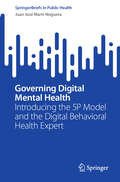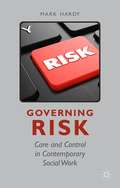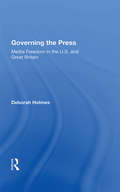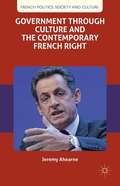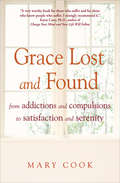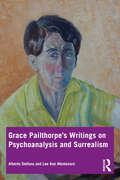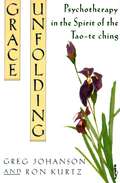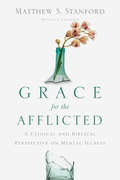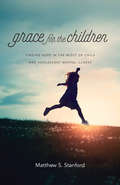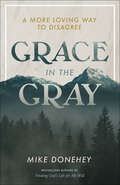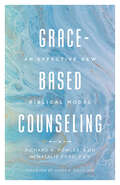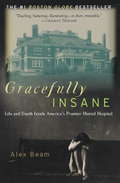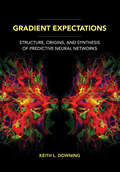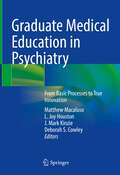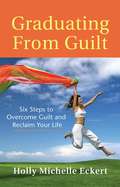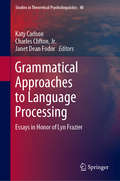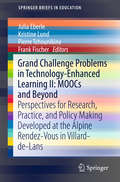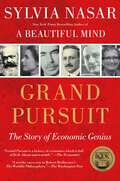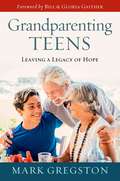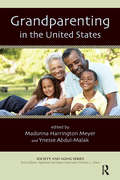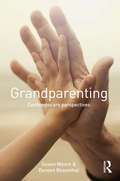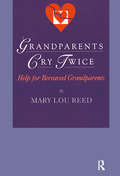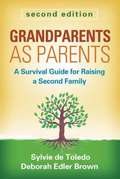- Table View
- List View
Governing Digital Mental Health: Introducing the 5P Model and the Digital Behavioral Health Expert (SpringerBriefs in Public Health)
by Juan José Martí-NogueraThis book presents a bold governance blueprint for an era in which mental health systems face a historic transition: as care delivery becomes increasingly shaped by code, platforms, and predictive algorithms, new governance frameworks are needed to protect equity, ethics, and human-centered leadership. At the core of this blueprint is the 5P Model – Predictive, Preventive, Personalized, Participatory, and Precision-based – a transformative framework for building equitable, effective behavioral health systems in the age of AI. The book introduces the Digital Behavioral Health Expert (DBHE), a new professional role designed to bridge clinical care, policy systems, and digital infrastructure. Unlike traditional mental health models that focus on professional interaction alone, the DBHE enables coordination across platforms, stakeholders, and jurisdictions – turning governance into a strategic, ethical, and human-centered function. Designed for stakeholders across the ecosystem – policymakers shaping regulation, managers implementing care systems, clinicians navigating hybrid models, developers building ethical tools, and investors backing scalable solutions – this book equips each with strategic insight for a digitally governed future of mental health. "A timely vision for ethical, inclusive governance in digital mental health."— Professor Anil Thapliyal, Executive Director, eMental Health International Collaborative (eMHIC)
Governing Risk
by Mark HardyDrawing on Foucault's later work on governmentality, this book traces the effects of 'the rise of risk' on contemporary social work practice. Focusing on two 'domains' of practice mental health social work and probation work it analyses the ways in which risk thinking has affected social work's aims and objectives, methods and approaches. It critically interrogates the claim that the logic of actuarialsim is implicated in a shift from 'care' to 'control' and argues the case for a distinctive approach to understanding and undertaking social work which does justice to the reality of contemporary practice. "
Governing The Press: Media Freedom In The U.s. And Great Britain
by Deborah HolmesJealously guarded and frequently defended, the concept of freedom of the press is still subject to widely varying interpretations in different democratic systems. This book compares and contrasts the ways in which the system limits and defines press freedom in two nations known for an unfettered press-the United States and Great Britain. Examining
Government through Culture and the Contemporary French Right
by Jeremy AhearneCulture, understood broadly, lay at the heart of contrasting right-wing strategies for government in France during the pivotal decade of 2002-2012. Looking at issues of secularism, education, televisual performance, public memory and nation-branding Ahearne analyses how presidents Chirac and Sarkozy sought to redefine contemporary French identity.
Grace Lost and Found: From Addictions and Compulsions to Satisfaction and Serenity
by Mary Cook&“Provides a process for personal reflection and a deeper understanding of addictive behavior and recovery.&”—Stephanie S. Covington, PhD, author of A Woman&’s Way Through the Twelve Steps Many recovery books are for the beginner, and that makes sense. But then what? This grace-filled book is for people at later stages in their recovery who are looking to uncover the underlying causes for their addiction and heal the psychological and spiritual pain, often lingering from childhood that many addicts bear. Grace Lost and Found is an inspirational and deep exploration of problems and pain—providing a compassionate approach to healing addictions, compulsions and other unhealthy habits. The 40 essays, each with their own set of practices and affirmations, engage readers on a journey through body, mind and spirit, symbolic symptoms, pain messages, levels of consciousness, and an expanded view of identity and life. The essays reach right to the bottom of the addict&’s bag of tricks—lack of accountability, the tendency to externalize blame, willfulness, defending and pretending, immaturity, denial—and offer wise, compassionate, and get-real spiritual counsel. As Cook reminds us, we tend to grow most from pain and crisis: &“I help people find the ultimate treasure in their problems, the messages in their pain and the metaphors in their symptoms. We are all being guided to a higher, healthier path, when we pay attention.&” &“An empowering resource for healing the wounds of the past, thriving in the face of adversity and rejection, and creating your authentic self.&”—Bernie Siegel, MD, #1 New York Times bestselling author of Peace, Love and Healing
Grace Pailthorpe’s Writings on Psychoanalysis and Surrealism
by Alberto Stefana Lee Ann MontanaroThis book gathers the published and unpublished writings of Dr Grace Pailthorpe (1883-1971), English surgeon, specialist in psychological medicine and surrealist artist to provide an in-depth study of her work and legacy. Pailthorpe’s theoretical understanding of the psyche informed her approach to art, setting her work apart from other Surrealist artists by unifying artistic, scientific and therapeutic aims. Pailthorpe considered Surrealism to be a method of investigation into unconscious mental life, and believed that it was essential that the repressed part of our minds should find expression. By bringing her artistic and theoretical work to light, Montanaro and Stefana reassert Pailthorpe’s significance to the histories of both psychoanalysis and Surrealism, rendering the cross-disciplinary relevance of her work accessible to a contemporary audience. This book will prove to be a rich resource for scholars and students interested in psychoanalysis and art history, and provides an invaluable case study for the continuing significance of visual artistic practices to clinical work.
Grace Unfolding: Psychotherapy in the Spirit of Tao-te ching
by Greg Johanson Ronald S. KurtzA sensible and compassionate book that will help those involved in any form of therapy make the best possible use of their time, effort, and money. "A fascinating blend of Eastern spirituality, Western psychotherapy, feminist consciousness, and real caring."--Riane Eisler, author of The Chalice and the Blade 35 black-and-white photographs.From the Trade Paperback edition.
Grace for the Afflicted: A Clinical and Biblical Perspective on Mental Illness
by Matthew S. StanfordGrace for the Afflictedbipolar disorderstrauma- and stressor-related disordersdementiacerebrovascular accidents (stroke)traumatic brain injurysuicidea holistic approach to recoverymental health and the church
Grace for the Children: Finding Hope in the Midst of Child and Adolescent Mental Illness
by Matthew S. StanfordThe church's response to child and adolescent mental health disorders has too often been characterized by fear and misinformation rather than grace or wisdom.Grace for the Childrenautism spectrum disorderattention deficit hyperactivity disorderdisruptive behavior disordersdepressionbipolar disordersanxietyposttraumatic stress disorderobsessive compulsive and related disorderseating disordersGrace for the Children
Grace in the Gray: A More Loving Way to Disagree
by Mike DoneheyBy approaching disagreements in a more loving way and seeing the grace and good in those who hold differing viewpoints, you'll gain a deeper understanding of others, yourself, and God—from the bestselling author of Finding God's Life for My Will. &“Written with just the right amount of humor, reflection, and heart, Grace in the Gray shows us how to focus on the people we may disagree with more than focusing on the issue at hand.&”—Mac Powell, Grammy Award–winning singer and songwriterIn a culture where constant offense and polarization dominate so many interactions, here is good news about a more productive way to disagree: God desires for us to become better at loving others . . . not better at debating. Grace in the Gray helps us see the grace and good that&’s often hidden by our own limited perspectives and assumptions. Through a collection of personal stories and biblical insights, Mike Donehey reveals a four-stage process to help you1. subjectify those you&’ve objectified2. empathize with those you&’ve vilified3. humanize those you&’ve deified4. see why your posture is as essential as your positionIn relationships, professional settings, and social situations, discover how to focus on the person standing before you more than the argument set against you. Doing so gives you the rare ability to face any conflict with better questions, kindness, and the calming posture of curiosity.It all begins by learning to listen and lead with the most transformative substance the universe has ever known . . . God&’s love.
Grace-Based Counseling: An Effective New Biblical Model
by Richard A. Fowler, EdD Natalie Ford, PhDYou speak God&’s truth when you counsel. But do you also communicate His grace?The Christian counselor or pastor plays an important role in helping people process the trauma they&’ve experienced. Too often, a client leaves the counselor&’s office with feelings of guilt and shame. They feel the heavy burden of what they did wrong. But somehow, they&’ve missed the grace of God that makes things right again.A counseling model that stays true to a biblical worldview will overflow with grace . . . not cheap grace, but real grace that acknowledges sin while offering a hopeful path to redemption and healing. In Grace-Based Counseling, professional counselors Richard Fowler and Natalie Ford offer a model that blends the truths of Scripture, the science of psychology, and the everlasting hope of the gospel. In this book you will find:New, grace-based counseling modelDetailed application of the model, with case studiesPractical toolbox with surveys, assessments, and counseling helpsA Christian counseling model can&’t just be about admonishment. That approach only leads to shame and human efforts that are doomed to fail. But when the gospel is brought to bear in the counseling relationship, real life change is possible. Then the counselor becomes an instrument of divine grace in the hands of a faithful God.
Grace-Based Counseling: An Effective New Biblical Model
by Richard A. Fowler, EdD Natalie Ford, PhDYou speak God&’s truth when you counsel. But do you also communicate His grace?The Christian counselor or pastor plays an important role in helping people process the trauma they&’ve experienced. Too often, a client leaves the counselor&’s office with feelings of guilt and shame. They feel the heavy burden of what they did wrong. But somehow, they&’ve missed the grace of God that makes things right again.A counseling model that stays true to a biblical worldview will overflow with grace . . . not cheap grace, but real grace that acknowledges sin while offering a hopeful path to redemption and healing. In Grace-Based Counseling, professional counselors Richard Fowler and Natalie Ford offer a model that blends the truths of Scripture, the science of psychology, and the everlasting hope of the gospel. In this book you will find:New, grace-based counseling modelDetailed application of the model, with case studiesPractical toolbox with surveys, assessments, and counseling helpsA Christian counseling model can&’t just be about admonishment. That approach only leads to shame and human efforts that are doomed to fail. But when the gospel is brought to bear in the counseling relationship, real life change is possible. Then the counselor becomes an instrument of divine grace in the hands of a faithful God.
Gracefully Insane: The Rise and Fall of America's Premier Mental Hospital
by Alex BeamIts landscaped ground, chosen by Frederick Law Olmsted and dotted with Tudor mansions, could belong to a New England prep school. There are no fences, no guards, no locked gates. But McLean Hospital is a mental institution-one of the most famous, most elite, and once most luxurious in America. McLean "alumni" include Olmsted himself, Robert Lowell, Sylvia Plath, James Taylor and Ray Charles, as well as (more secretly) other notables from among the rich and famous. In its "golden age," McLean provided as genteel an environment for the treatment of mental illness as one could imagine. But the golden age is over, and a downsized, downscale McLean-despite its affiliation with Harvard University-is struggling to stay afloat. Gracefully Insane, by Boston Globe columnist Alex Beam, is a fascinating and emotional biography of McLean Hospital from its founding in 1817 through today. It is filled with stories about patients and doctors: the Ralph Waldo Emerson protégé whose brilliance disappeared along with his madness; Anne Sexton's poetry seminar, and many more. The story of McLean is also the story of the hopes and failures of psychology and psychotherapy; of the evolution of attitudes about mental illness, of approaches to treatment, and of the economic pressures that are making McLean-and other institutions like it-relics of a bygone age. This is a compelling and often oddly poignant reading for fans of books like Plath's The Bell Jar and Susanna Kaysen's Girl, Interrupted (both inspired by their author's stays at McLean) and for anyone interested in the history of medicine or psychotherapy, or the social history of New England.
Gradient Expectations: Structure, Origins, and Synthesis of Predictive Neural Networks
by Keith L. DowningAn insightful investigation into the mechanisms underlying the predictive functions of neural networks—and their ability to chart a new path for AI.Prediction is a cognitive advantage like few others, inherently linked to our ability to survive and thrive. Our brains are awash in signals that embody prediction. Can we extend this capability more explicitly into synthetic neural networks to improve the function of AI and enhance its place in our world? Gradient Expectations is a bold effort by Keith L. Downing to map the origins and anatomy of natural and artificial neural networks to explore how, when designed as predictive modules, their components might serve as the basis for the simulated evolution of advanced neural network systems.Downing delves into the known neural architecture of the mammalian brain to illuminate the structure of predictive networks and determine more precisely how the ability to predict might have evolved from more primitive neural circuits. He then surveys past and present computational neural models that leverage predictive mechanisms with biological plausibility, identifying elements, such as gradients, that natural and artificial networks share. Behind well-founded predictions lie gradients, Downing finds, but of a different scope than those that belong to today&’s deep learning. Digging into the connections between predictions and gradients, and their manifestation in the brain and neural networks, is one compelling example of how Downing enriches both our understanding of such relationships and their role in strengthening AI tools. Synthesizing critical research in neuroscience, cognitive science, and connectionism, Gradient Expectations offers unique depth and breadth of perspective on predictive neural-network models, including a grasp of predictive neural circuits that enables the integration of computational models of prediction with evolutionary algorithms.
Graduate Medical Education in Psychiatry: From Basic Processes to True Innovation
by Matthew Macaluso L. Joy Houston J. Mark Kinzie Deborah S. CowleyThis book functions as a guide for leaders in academic and non-academic settings who are interested in developing, managing, or improving new or existing psychiatry residency programs. It notes the complexity of administering a residency program with ready solutions and tactics. Unique and comprehensive, this book contains chapters that focus on key areas of residency program management and innovation including but not limited to: meeting accreditation requirements, clinical and didactic curriculum, managing resident and faculty performance issues, research and scholarly activity in residency programs, rural training programs, and faculty development. Graduate Medical Education in Psychiatry is an invaluable resource for medical education leaders, as well as trainees and those interested in psychiatric residency or academic psychiatry in general.
Graduating From Guilt: Six Steps to Overcome Guilt and Reclaim Your Life
by Holly Michelle EckertThrough a simple, step-by-step progression, this handbook provides individuals with the means to learn how to quiet their inner critic and to experience forgiveness, self-acceptance, and empowerment. Employing a methodology rooted in the principles of nonviolent communication, the process lays out a path for achieving freedom from toxic and emotionally draining guilt, blame, and shame. Examples of real-world situations enable individuals to visualize how they, like others, can forgive themselves for past mistakes and successfully mend broken relationships.
Grammar for Teachers: A Guide to American English for Native and Non-Native Speakers (Springer Texts in Education)
by Andrea DeCapuaUpdated and revised with more examples and expanded discussions, this second edition continues the aim of providing teachers with a solid understanding of the use and function of grammatical structures in American English. The book avoids jargon and presents essential grammatical structures clearly and concisely. Dr. DeCapua approaches grammar from a descriptive rather than a prescriptive standpoint, discussing differences between formal and informal language, and spoken and written English. The text draws examples from a wide variety of authentic materials to illustrate grammatical concepts. The many activities throughout the book engage users in exploring the different elements of grammar and in considering how these elements work together to form meaning. Users are encouraged to tap into their own, often subconscious, knowledge of grammar to consciously apply their knowledge to their own varied teaching settings. The text also emphasizes the importance of understanding grammar from the perspective of English language learners, an approach that allows teachers to better appreciate the difficulties these learners face. Specific areas of difficulties for learners of English are highlighted throughout.
Grammatical Approaches to Language Processing: Essays In Honor Of Lyn Frazier (Studies in Theoretical Psycholinguistics #48)
by Charles Clifton Katy Carlson Janet Dean FodorThis book contains papers that were written to honor Professor Lyn Frazier on the occasion of her retirement from the University of Massachusetts Amherst. Some were presented at the Lynschrift on May 19-20, 2018; others were written especially for this volume. The papers report original research on, or research-based theoretical analyses of, several of the domains that Professor Frazier contributed to during her career. The volume begins with a brief overview of Professor Frazier's research contributions and an appreciation of the contributions she has made to the field of psycholinguistics and to her students and colleagues. The next several chapters discuss the roles that prosody plays in language processing, and the volume continues with chapters on the topic that established Professor Frazier as a major psycholinguistic theorist, syntactic processing. The volume then explores the roles semantics and pragmatics play in language comprehension, and concludes with reports of applications and extensions of research on language processing. All chapters were contributed by current and former students and colleagues of Professor Frazier in gratitude for the impact she has had on their lives and careers.
Grand Challenge Problems in Technology-Enhanced Learning II: MOOCs and Beyond
by Frank Fischer Julia Eberle Kristine Lund Pierre TchounikineThis book reports on the proceedings at the STELLAR Alpine Rendez-Vous 2013, presenting strategies in handling challenges that arise when using technology-enhanced learning (TEL). With insightful contributions from leading teachers, practitioners, researchers and policy makers, this volume will inspire everyone interested in TEL in their future projects. This book continues the influential work of the STELLAR network which was funded by the European Commission to structure the research area of technology-enhanced learning and continues to the work on the previously developed research vision. It has potential to become influential in Europe, North America and Asia.
Grand Pursuit: The Story of Economic Genius
by Sylvia NasarIn a sweeping narrative, the author of the megabestseller A Beautiful Mind takes us on a journey through modern history with the men and women who changed the lives of every single person on the planet. It’s the epic story of the making of modern economics, and of how economics rescued mankind from squalor and deprivation by placing its material fate in its own hands rather than in Fate. Nasar’s account begins with Charles Dickens and Henry Mayhew observing and publishing the condition of the poor majority in mid-nineteenth-century London, the richest and most glittering place in the world. This was a new pursuit. She describes the often heroic efforts of Marx, Engels, Alfred Marshall, Beatrice and Sydney Webb, and the American Irving Fisher to put those insights into action—with revolutionary consequences for the world. From the great John Maynard Keynes to Schumpeter, Hayek, Keynes’s disciple Joan Robinson, the influential American economists Paul Samuelson and Milton Freedman, and India’s Nobel Prize winner Amartya Sen, she shows how the insights of these activist thinkers transformed the world—from one city, London, to the developed nations in Europe and America, and now to the entire planet. In Nasar’s dramatic narrative of these discoverers we witness men and women responding to personal crises, world wars, revolutions, economic upheavals, and each other’s ideas to turn back Malthus and transform the dismal science into a triumph over mankind’s hitherto age-old destiny of misery and early death. This idea, unimaginable less than 200 years ago, is a story of trial and error, but ultimately transcendent, as it is rendered here in a stunning and moving narrative.
Grandparenting Teens: Leaving a Legacy of Hope
by Mark GregstonThree million kids have grandparents parenting them. Are you one of those grandparents? Are you in need of some help? Are you in a crisis with your teen that you're not sure anyone has an answer for?There are natural communication barriers between grandparents and their teenage grandkids: • new and old cultures collide and the relationship sometimes flies out the window • hurtful words stab at a grandparent trying to help • memories are missed and arguments explode in a family Both grandparents and grandkids face these triggers, but from opposite sides. And sometimes they result in teens getting into drugs, kids smoldering in unexpressed anger that deepens into depression, and kids even harming themselves. The teenagers want attention and relationships; grandparents want to help. Help is available from author and well-known family expert Mark Gregston who has worked in teenage and family ministries such as Young Life and his own program, Heartlight, for over forty years. For Gregston, it&’s all about relationships. Teens need to find out why they think no one understands them. And they need help to guide them through this contradictory world. Grandparenting Teens is a valuable resource that helps grandparents love their teens and relate to them in genuine, honest, life-changing ways. This book gives practical tips on how to start grandparenting teens in a way that fosters connection. Mark teaches skills such as getting everyone to listen—really listen. As a grandparent, you can help your teen learn to paint their honest, big-picture perspective, so no one&’s left out of their world. They will learn gratefulness instead of giving grief. They will recognize when their grandparent understands their troubles and becomes their role model for life when everyone else turns away. And both grandparents and teens will find their point of contact—their bond. Gregston&’s stories will entertain you. They will teach you. They will move you. Some will even change your life. This book is a must for every grandparent who wants to continue to have an influence on the life of their teen grandchildren. In this ever-important role, grandparents can offer something to their grandkids that they can receive from no one else.
Grandparenting in the United States
by Madonna Harrington Meyer Ynesse Abdul-MalakThe contributors to Grandparenting in the United States, edited by Madonna Harrington Meyer and Ynesse Abdul-Malak of Syracuse University, use a variety of quantitative and qualitative data sets to assess how grandparenting, and its impacts, vary by living arrangements, economic status, education, gender, race, ethnicity, and other stratifying variables. Some papers assess how the provision of financial assistance, particularly during economic downturns, may be easily absorbed or financially detrimental. Others demonstrate how immigrant grandparents navigate multiple sets of cultural expectations to provide childcare to their grandchildren. Some show how Hispanic grandparents acculturation level is linked to childcare and financial transfer across generations. Others emphasize the extent to which schoolchildren with disabilities are more likely to receive grandparent care, particularly if the mother is single. Some reveal how custodial grandmothers are significantly more likely to be poor, face social isolation, and report poorer health. Others enumerate the positive, and negative, impacts of frequent interaction for both generations. In total, the volume underscores the impact of evolving diversification of grandparenting across multiple generations.
Grandparenting: Contemporary Perspectives
by Doreen Rosenthal Susan MooreGrandparenting: Contemporary Perspectives is one of the first books of its kind to offer a dedicated account of the social and psychological research on this important life stage. Reflecting the contemporary positive approach to ageing, it covers many of the issues that impact the grandparent experience today, such as care-giving and changing family structures, to reveal the health and wellbeing benefits of the grandparent role. It examines biological, psychological, social/ familial, gender, cultural and economic dimensions to map out the current landscape in this emerging field. Moore and Rosenthal draw on quantitative and qualitative, experimental, survey, observation and case study research, including unique data on grandfathers. They examine how people respond to the challenges and possibilities of grandparenting, and how this influences intergenerational relationships and adapting to growing older. The book provides a comprehensive, up-to-date evidence base for students in health, sociology and psychology and those interested in gerontology and the lifespan.
Grandparents Cry Twice: Help for Bereaved Grandparents (Death, Value and Meaning Series)
by Mary Lou Reed"Grandparents Cry Twice: Help for Bereaved Grandparents" is a book about grandparents' dual sorrow when a grandchild dies. They cry for their lost grandchild and they also cry for the terrible grief they see their own child having to bear. The author, Mary Lou Reed, writes of her experiences when her beloved grandson, Alex, died. Through her personal story she touches the universal in all grandparents' grief.
Grandparents as Parents, Second Edition
by Sylvie De Toledo Deborah Edler BrownIf you're among the millions of grandparents raising grandchildren today, you need information, support, and practical guidance you can count on to keep your family strong. This is the book for you. Learn effective strategies to help you cope with the stresses of parenting the second time around, care for vulnerable grandkids and set boundaries with their often-troubled parents, and navigate the maze of government aid, court proceedings, and special education. Wise, honest, moving stories show how numerous other grandparents are surviving and thriving in their new roles. Updated throughout, and reflecting current laws and policies affecting families, the second edition features new discussions of kids' technology use and other timely issues.
